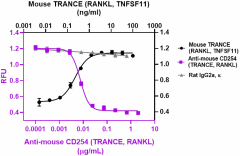- Clone
- W17172A (See other available formats)
- Regulatory Status
- RUO
- Other Names
- Tumor necrosis factor ligand superfamily member 11, Osteoclast differentiation factor, ODF, Osteoprotegerin ligand, OPGL, Receptor activator of nuclear factor kappa-B ligand, RANKL, TNF-related activation-induced cytokine, TRANCE, CD254, TNFSF11
- Isotype
- Rat IgG2a, κ

-

Recombinant Mouse TRANCE (RANKL, TNFSF11) (carrier-free) (Cat. No. 769406) (black circles) induces osteoclast differentiation in mouse RAW.264.7 cells. Ultra-LEAF™ purified anti-mouse CD254 (TRANCE, RANKL) (clone W17172A) (purple squares) inhibits the effect of recombinant mouse TRANCE (RANKL) at 4 ng/mL in RAW.264.7 cells in a dose-dependent manner, as measured by TRAP (tartrate-resistant acid phosphatase) assay. However, the GoInVivo™ purified Rat IgG2a, κ isotype control (Cat. No. 400562) (gray triangles) does not have the effect. ND50 range: 7 - 35 ng/mL
| Cat # | Size | Price | Quantity Check Availability | ||
|---|---|---|---|---|---|
| 602953 | 100 µg | $358.00 | |||
Select size of product is eligible for a 40% discount! Promotion valid until September 30, 2024. Exclusions apply. To view full promotion terms and conditions or to contact your local BioLegend representative to receive a quote, visit our webpage.
RANKL gene encodes a type II membrane protein of 316 amino acids with a predicted molecular mass of 35 kD. RANKL is cleaved to produce a soluble form with biological activity. The shedding of membrane-bound RANKL appears to be mediated by expression of MMP14 and ADAM10. Suppression of MMP14 in primary osteoblasts increases membrane-bound RANKL and promotes osteoclastogenesis in cocultures with macrophages. Therefore, RANKL shedding seems to be an important process that down-regulates local osteoclastogenesis. Alternatively, an increased production of RANKL by osteoblastic cells leads to osteoclast differentiation, activation, and survival, which results in increased bone resorption. Binding of RANKL to its receptor RANK activates TNF receptor-associated factor 6 (TRAF6), which is linked to downstream pathways including NF-κB, c-jun N-terminal kinase (JNK) or Src. TRAF6 has been shown to be necessary for the differentiation of osteoclastic cells by enhancing Src kinase, essential for osteoclast function.
Product Details
- Verified Reactivity
- Mouse
- Antibody Type
- Monoclonal
- Host Species
- Rat
- Immunogen
- Recombinant mouse RANKL
- Formulation
- 0.2 µm filtered in phosphate-buffered solution, pH 7.2, containing no preservative.
- Preparation
- The Ultra-LEAF™ (Low Endotoxin, Azide-Free) antibody was purified by affinity chromatography.
- Concentration
- The antibody is bottled at the concentration indicated on the vial, typically between 2 mg/mL and 3 mg/mL. To obtain lot-specific concentration and expiration, please enter the lot number in our Certificate of Analysis online tool.
- Storage & Handling
- The antibody solution should be stored undiluted between 2°C and 8°C. This Ultra-LEAF™ solution contains no preservative; handle under aseptic conditions.
- Application
-
Neut - Quality tested
- Recommended Usage
-
Each lot of this antibody is quality control tested by the neutralization of osteoclast differentiation induced by recombinant mouse TRANCE (RANKL) (Cat. No. 769406) at 4 ng/mL in mouse RAW.264.7 cells. ND50 range: 7 - 35 ng/mL. It is recommended that the reagent be titrated for optimal performance for each application.
- RRID
-
AB_2922632 (BioLegend Cat. No. 602953)
Antigen Details
- Structure
- Cytokine
- Distribution
-
Predominantly expressed in monocytes, macrophages, polymorphonuclear cells, B cells. Detected in microglial cells and Treg cells. Inducible in keratinocytes and endothelial cells.
- Function
- Potent stimulator of osteoclast formation from precursor cells and bone-resorbing activity in mature osteoclasts. Augments the ability of dendritic cells to stimulate naïve T-cell proliferation. Activates JNK and NF-κB and induces the expression of IL-1, IL-6, IL-12, and IL-15 in dendritic cells. Crucial factor in lymphocyte development and lymph node organogenesis. Stimulates proliferation, adhesion, and IL-7 expression of thymic epithelial cells. RANKL expression, in human and murine osteoblastic cells, is stimulated by various cytokines (IL-1, TNF-α and IL-11) and calciotrophic hormones including PTH, 1, 25-dihydroxyvitamin D3 (1,25D3), and prostaglandin E2.
- Interaction
- T cells, dendritic cells, bone marrow derived macrophages, osteoclast precursors and mature osteoclasts
- Ligand/Receptor
- TNFRSF11A (Tumor necrosis factor receptor superfamily, member 11A) also called RANK and TNFRSF11B (OPG) which acts as a decoy receptor for RANKL and as a potent inhibitor of osteoclast formation.
- Cell Type
- Osteoclasts, T cells
- Biology Area
- Cell Biology, Immunology
- Molecular Family
- CD Molecules, Cytokines/Chemokines
- Antigen References
-
- Dehm SM, et al. 2004. Biochem Cell Biol. 82:263-74.
- Hikita A, et al. 2006. J Biol Chem. 281:36846-55.
- Kim NS, et al. 2006. Mol Cell Biol. 26:1002-13.
- Wada T, et al. 2006. TRENDS Mol Med. 12:17-25.
- Lee HW, et al. 2008. Exp Mol Med. 40:59-70.
- Ha J, et al. 2010. J Immunol. 184:4717-24.
- Gene ID
- 21943 View all products for this Gene ID
- UniProt
- View information about CD254 on UniProt.org
Other Formats
View All CD254 Reagents Request Custom Conjugation| Description | Clone | Applications |
|---|---|---|
| Ultra-LEAF™ Purified anti-mouse CD254 (TRANCE, RANKL) | W17172A | Neut |
Compare Data Across All Formats
This data display is provided for general comparisons between formats.
Your actual data may vary due to variations in samples, target cells, instruments and their settings, staining conditions, and other factors.
If you need assistance with selecting the best format contact our expert technical support team.
-
Ultra-LEAF™ Purified anti-mouse CD254 (TRANCE, RANKL)

Recombinant Mouse TRANCE (RANKL, TNFSF11) (carrier-free) (Ca...
